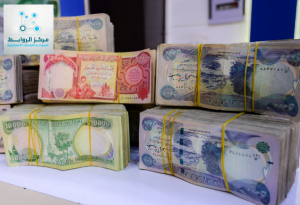By: Shatha Kalel
The Iraqi economy has long been characterized by its heavy dependence on oil revenues, a legacy dating back to the discovery of oil in the early twentieth century. The country’s economic fortunes are closely linked to the global oil market, with oil accounting for approximately 90% of government revenues and 95% of export earnings. This dependence has made Iraq particularly vulnerable to oil price fluctuations, which have historically affected its financial stability and economic development. The 2024 budget aims to overcome these challenges while seeking to achieve economic diversification and stability.
Key Features of Iraq’s 2024 Budget
Iraq’s 2024 budget and its approval bring opportunities and challenges to the forefront of the country’s economic landscape. The economy’s heavy dependence on oil revenues continues to shape fiscal policy, while efforts to diversify sources of income remain critical. This analysis delves into the potential impacts of oil price volatility, the detailed breakdown of budget expenditures, and the broader implications for Iraq’s economic stability and development.
Oil Price Volatility and Economic Impact
Oil remains the lifeblood of the Iraqi economy. In 2024, the country aims to export 3.5 million barrels of oil per day at an estimated price of $75 per barrel. This would generate approximately $94 billion annually. Subtracting necessary expenditures of $77.4 billion, a surplus of $16.6 billion remains. After accounting for basic services costs of $12 billion, Iraq is left with a modest surplus of $4.6 billion. However, if oil prices fall to $50 per barrel, Iraq will have difficulty meeting its financial obligations, highlighting the risky nature of relying heavily on a single commodity.
Distribution of Budget Expenditures
The 2024 budget identifies several key areas of spending:
Public services: $12 billion
Purchases of rations and wheat: $7 billion
Electricity purchases from investors: $3 billion
Fuel purchases: $3 billion
Ministry of Health medicines: $3 billion
Debt service: the remainder of the budget
These expenditures confirm the government’s commitment to maintaining basic services and supporting economic stability.
Non-Oil Revenues and Economic Diversification
The budget also forecasts significant non-oil revenues, including:
Customs and excise: a crucial element of revenue flow, although exact figures in this context are not specified.
Other resources: estimated at $20 billion
Despite these expectations, the ability to achieve these revenue targets remains uncertain, especially in light of the volatile economic environment and challenges to enhancing tax collection and customs efficiency.
Strategic Considerations and Challenges
Project Disbursement and Prioritization:
Timely allocation and disbursement of funds to various projects will be critical. It remains to be seen which projects will be prioritized and how effectively they will be implemented.
Regional Disparities:
Questions arise regarding the equitable distribution of funds between provinces. For example, Dhi Qar has a reconstruction fund, while Amara and Al-Muallem do not, raising concerns about regional development imbalance.
Alignment with National Strategies:
Aligning the budget with the national development strategy and the broader program of the government is another critical factor. There must be a coherent strategy that enhances oil revenues while promoting economic diversification.
Long-Term Financial Strategy:
Developing a strong long-term strategy based on oil revenues is essential. This includes managing the balance between capitalist and socialist economic principles, ensuring sustainable development, and addressing structural issues.
Legislative Oversight and Accountability:
The role of the House of Representatives in supervising the budget, liquidating advances from previous years, and ensuring transparency in financial management cannot be overemphasized. Detailed audits and accountability measures are essential for long-term financial health.
In Conclusion Iraq’s 2024 budget presents a mixed set of opportunities and challenges. Although there are positive aspects, such as the potential surplus from oil revenues and planned non-oil revenues, economic stability remains vulnerable to external shocks such as oil price volatility. The government’s ability to effectively implement its budget, prioritize critical projects, address regional disparities, and align with national development strategies determines the country’s economic trajectory. It is essential that policymakers carefully address these complexities to ensure sustainable growth and improve the standard of living for all Iraqis.
Economic Studies Unit / North America Office
Rawabet Center for Research and Strategic Studie

